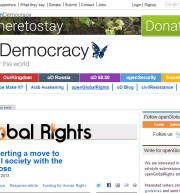
A piece by Maina Kiai has been featured in openGlobalRights, a multi-lingual ezine that covers global human rights. In the article, Kiai discusses legislation introduced in Kenya that would have capped foreign funding to NGOs. The law looked to be a death-knell for a vibrant civil society sector that has long been a shining example for the region. Luckily, after sustained local and international pressure, the legislation was narrowly defeated in the National Assembly in December. Kenya is not out of the woods yet - the legislation may re-emerge next year. But Kiai argues that its experiences could be instructive for countries where civil society faces similar threats. Click here for a link to the piece. Update Jan. 13, 2014: The article is also now available in French.... Continue reading →
Blantyre, Malawi – Maina Kiai told a conference of civil society leaders in Malawi today that African civil society is “under attack” from all angles and facing a crisis of shrinking space, as underscored by recent developments in Kenya and South Sudan. “Governments across the region are moving rapidly to squeeze civil society out of its rightful place in the public sphere,” Kiai said after the speech. “They see civil society as a competitor, challenging their authority. And they are attacking from all angles – cutting off their ability to seek funds, imposing improper registration requirements, and harassing people who speak out.” Kiai, the United Nations’ Special Rapporteur on the freedoms of peaceful assembly and of association, spoke of the attacks during a keynote address on the first day of the ACT Alliance regional consultation on civil society space in Blantyre. The consultation was convened to explore ways that civil society groups in the region can ensure their ability to operate in a so-called “enabling environment.” Such an environment includes a functioning democratic judicial system, vibrant freedoms of expression, assembly and association, and the ability to secure funding and participate in public affairs. Kiai pointed to numerous examples of shrinking civil... Continue reading →

A number of UN human rights experts on Thursday expressed their dismay at the continuing abuse of anti-terrorism legislation to curb freedom of expression in Ethiopia. A week ago, three journalists and two opposition politicians* were given prison sentences ranging from 14 years to life imprisonment under Ethiopia's anti-terrorism laws. This follows the sentencing of two Swedish journalists to 11 years in prison on 27 December 2011. Another 24 defendants are scheduled to appear before the court on 5 March 2012, for various charges under the anti-terrorism law, several of whom may face the death sentence if convicted. “Journalists play a crucial role in promoting accountability of public officials by investigating and informing the public about human rights violations,” said Frank La Rue, UN Special Rapporteur on freedom of expression, who emphasized that “they should not face criminal proceedings for carrying out their legitimate work, let alone be severely punished. Ethiopia has an obligation to fully guarantee all individuals’ right to freedom of opinion and expression under international human rights law.” Ben Emmerson, Special Rapporteur on counter-terrorism and human rights, said that “the anti-terrorism provisions should not be abused and need to be clearly defined in Ethiopian... Continue reading →